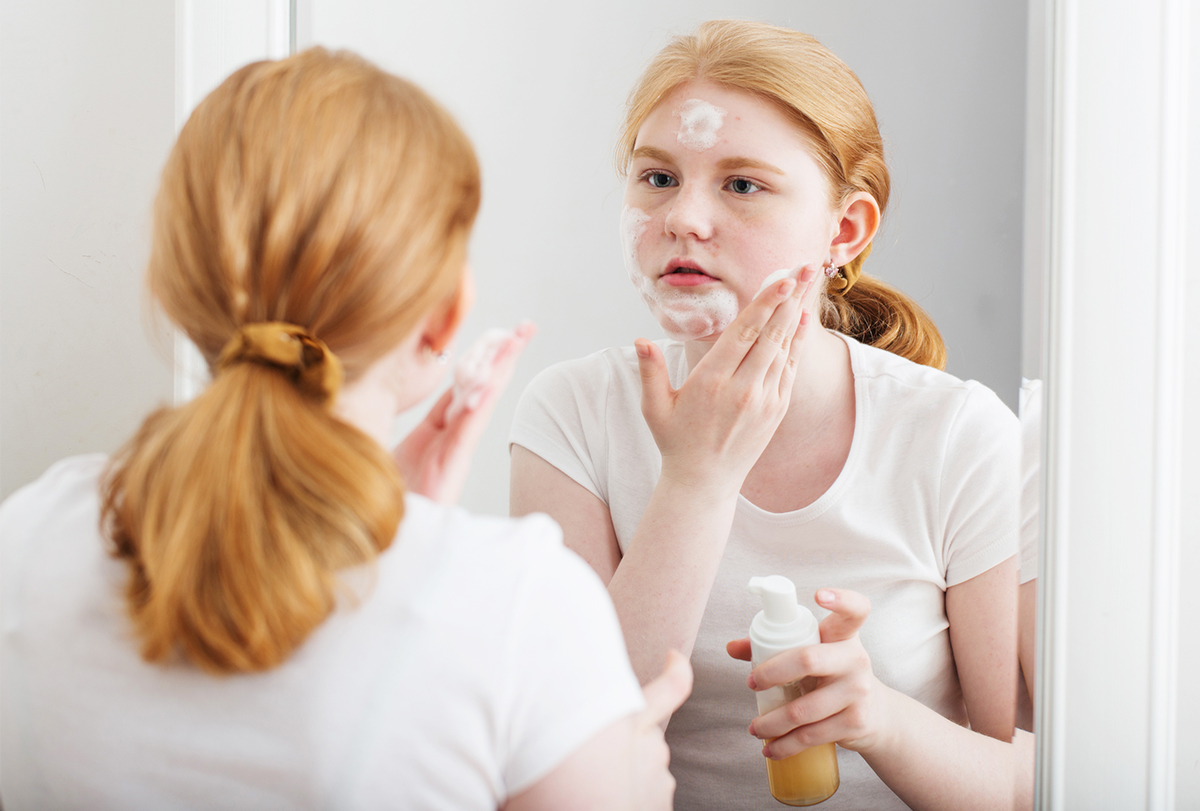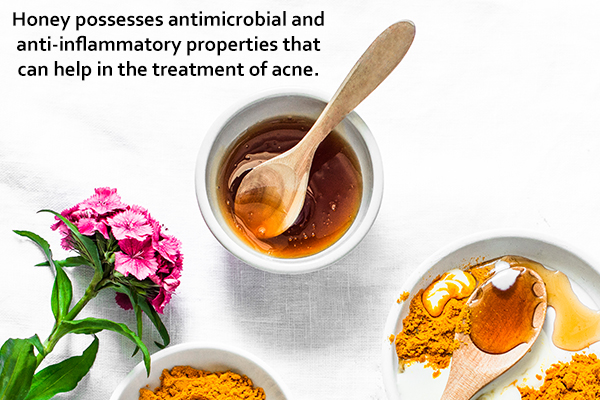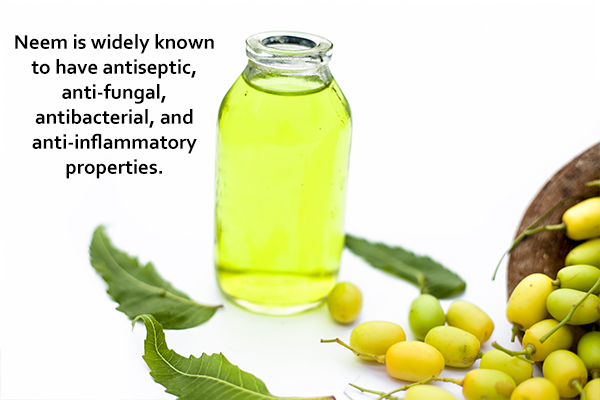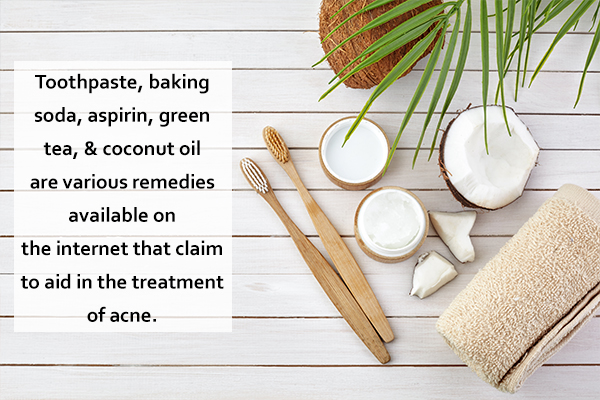In this article:
Acne, more commonly known as pimples, refers to the outbreak of skin lesions, usually on the face, chest, neck, back, and shoulders. While highly prevalent, acne is rarely a health concern. However, severe acne can lead to permanent scarring and often affects a person’s self-esteem.

This article discusses the various methods in the management and prevention of acne.
Home Remedies for Acne
Severe acne requires medical intervention, but mild acne that involves the development of whiteheads, blackheads, and pimples can be improved with the help of home remedies.
1. Use over-the-counter cleansers and creams
Over-the-counter cleansers are highly popular for helping clear acne. (1) You can also use products that contain vitamin A, retinoid, benzoic peroxide, and salicylic acid for the same.
2. Apply a honey mask

Honey possesses antimicrobial and anti-inflammatory properties that can help in the treatment of acne. (2) Honey is shown to inhibit the growth of various dermatological microbes and dermatophytes, such as Propionibacterium acnes, that cause acne. (3)(4)
How to use: You can either apply honey to the affected areas directly or use it as a mask.
- Mix 1 teaspoon of cinnamon or turmeric in 2 tablespoons of honey.
- Wash your face with a mild cleanser.
- Apply the honey paste on your face.
- Leave it for a few minutes and then gently wash your face.
3. Try essential oils for spot treatment
Resistant acne-causing microbes, such as Propionibacterium acnes and Staphylococcus epidermidis, may be treated with essential oils. (5)
One such essential oil with potent antimicrobial properties is tea tree oil. It helps prevent microbial growth in the sebaceous glands, thus inhibiting acne and pus formation. (6) Oregano essential oil also exhibits a strong antimicrobial effect against acne-causing bacteria. (5)
Jojoba oil is anecdotally used for acne treatment as well. While studies have demonstrated the anti-inflammatory nature of jojoba oil, there has been no direct scientific evidence for its use in acne treatment. (7)
Caution: It is important to dilute essential oils in a carrier oil such as coconut oil before use. Always perform a patch test to check for reactions.
Essential oils such as tea tree, jojoba, and oregano oil may be used as safe and efficacious alternative treatments for acne due to their antibacterial and anti-inflammatory properties.
4. Use witch hazel
Witch hazel is anti-inflammatory and astringent in nature and thus may help dry out inflammatory acne. (8) Witch hazel may help control acne and improve the appearance of inflamed and red facial skin when used as a part of an anti-acne skin care regimen. (9)
5. Apply neem oil

Neem is widely known to have antiseptic, antifungal, antibacterial, and anti-inflammatory properties. (10) Neem oil has also been used effectively for the prolonged treatment of acne. (11)
6. Try a 2%–3% hydrogen peroxide solution
A 2019 study concluded that a topical solution of 3% hydrogen peroxide (H2O2) reduces the bacterial burden of C. acnes. (12)
The use of hydrogen peroxide is also backed by substantial anecdotal evidence. It is thought to work by oxidizing the skin, which helps kill acne-causing bacteria.
How to use: Dip a clean cotton ball in hydrogen peroxide and apply it to your acne for a minute. Once it dries out, apply a moisturizer.
7. Use aloe vera gel
Aloe vera gel contains anti-inflammatory and antibacterial properties that can help treat mild to moderate acne. It is a safe topical agent, which can be used in combination with other treatments.
Aloe vera gel mixed with tretinoin cream was seen to significantly reduce mild to moderate acne as compared to tretinoin cream alone. (13) Another formulation of aloe vera gel was found to work better than 1% clindamycin gel for acne treatment. (14)
8. Try apple cider vinegar
Apple cider vinegar (ACV) is a popular anecdotal anti-acne agent, although its use is not supported by any scientific study. ACV is thought to help reduce acne formation by shrinking the pores and killing bacteria.
How to use: Dilute ACV with water, and apply the mixture to the affected areas using a cotton ball.
Biofeedback Therapy
While mild cases of acne can be treated with home remedies, moderate to severe acne may require alternative therapies. One such treatment is biofeedback therapy. This treatment modality chiefly focuses on dealing with anxiety and stress as triggers of acne. (15)
Self-Care Measures to Reduce Acne

For long-term treatment of acne, it is vital to take good care of your skin. The following tips may help:
- Avoid excessive washing of your skin as it can cause dryness and irritate the existing acne.
- It is best to wash your face twice a day with a mild cleanser containing benzoyl or salicylic acid, especially if you have oily skin that is prone to acne.
- Use only non-acnegenic or noncomedogenic skin products, including makeup, lotions, and creams.
- Abstain from picking or rubbing your pimples as it can aggravate the condition and even lead to infections and scarring.
- Limit your time under the sun as acne medications can make you prone to sunburns.
Dietary Recommendations for Acne
While diet is not proved to help treat or prevent acne, it may play a supportive role in treatment.
- Avoid consuming any foods that can worsen your acne, such as high-fat foods and dairy products.
- Try a hypoglycemic index diet to help lower acne incidence. (16)
- Consume zinc through nuts, beans, crab, lobster, and whole grains as zinc is known to help manage acne vulgaris. You may also take a supplement upon consulting your doctor. (17)
- You can also try using fish oil supplements to help lower the severity of acne. (18)(19) Also, include cold-water fatty fish (such as salmon, herring, and sardines), nuts and seeds (such as chia seeds, walnuts, and flaxseeds), and plant oils (such as canola oil and soybean oil) in your diet.
Lifestyle Changes for Acne Prevention
There is no surefire way to prevent acne, but you can take measures to reduce its appearance and severity. These lifestyle changes focus on keeping your pores clear and preventing oil buildup.
- Keep your hair out of your face.
- Do not use toners or rubbing alcohol that can dry out your face as this leads to overproduction of oil.
- Always remove your makeup before sleeping.
- Wash all your makeup tools and accessories thoroughly and avoid sharing.
- Wash your face after you come back from any heavy-polluted areas or after exercising and sweating to remove the dirt and sweat.
- Prevent contact of your styling gel or hairspray from your face.
- Use only water-based lotions and makeup products.
- Wash your hair daily if it is oily to prevent grease buildup.
- Avoid using strong soaps or scrub pads on your face.
- Exfoliate your skin using a scrub regularly.
Other Suggested Acne Remedies

Various remedies available on the Internet claim to aid in the treatment of acne. However, most of these remedies are not backed by scientific evidence. They are purely based on anecdotal observances and work only for a few.
Therefore, it is best to try other proven remedies instead of the following:
- Toothpaste: While toothpaste is thought to help with the spot treatment of acne, it is not recommended by clinicians.
- Baking soda: Baking soda is known to work against gram-negative bacteria. However, it is not useful for acne, as acne-causing bacteria are gram positive.
- Aspirin: Aspirin mask is yet another anecdotal remedy that is usually not effective.
- Green tea: It is known to possess antimicrobial properties against various microbes, but it has not been studied for acne treatment. (20)
- Coconut oil: The use of coconut oil may help in acne treatment to some extent due to its anti-inflammatory, antimicrobial, and antioxidant properties. It contains lauric acid, whose derivative is seen to act against Propionibacterium acnes. (21) However, coconut oil is also found to aggravate acne in some.
Final Word
The accumulation of oil, dirt, and dead skin cells in the hair follicles can cause acne. The excessive oil production is generally seen in puberty due to hormonal changes.
While acne cannot be completely avoided, making lifestyle changes and early treatment can help reduce acne and prevent scarring. You can also try home remedies as an adjunct to medical treatment to prevent acne flare-ups. Consult a doctor if you have moderate to severe acne.

- Was this article helpful?
- YES, THANKS!NOT REALLY


